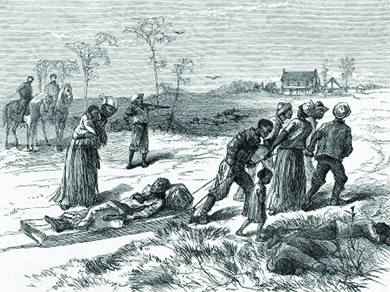| << Chapter < Page | Chapter >> Page > |
Second, the Republican Party experienced internal squabbles and divided into two factions. Some Republicans began to question the expansive role of the federal government, arguing for limiting the size and scope of federal initiatives. These advocates, known as Liberal Republicans because they followed classical liberalism in championing small government, formed their own breakaway party. Their ideas changed the nature of the debate over Reconstruction by challenging reliance on federal government help to bring about change in the South. Now some Republicans argued for downsizing Reconstruction efforts.
Third, the Grant administration became mired in scandals, further tarnishing the Republicans while giving Democrats the upper hand. One scandal arose over the siphoning off of money from excise taxes on whiskey. The “Whiskey Ring,” as it was called, involved people at the highest levels of the Grant administration, including the president’s personal secretary, Orville Babcock. Another scandal entangled Crédit Mobilier of America, a construction company and part of the important French Crédit Mobilier banking company. The Union Pacific Railroad company, created by the federal government during the Civil War to construct a transcontinental railroad, paid Crédit Mobilier to build the railroad. However, Crédit Mobilier used the funds it received to buy Union Pacific Railroad bonds and resell them at a huge profit. Some members of Congress, as well as Vice President Schuyler Colfax, had accepted funds from Crédit Mobilier in return for forestalling an inquiry. When the scam became known in 1872, Democratic opponents of Reconstruction pointed to Crédit Mobilier as an example of corruption in the Republican-dominated federal government and evidence that smaller government was better.
The Democratic Party in the South made significant advances in the 1870s in its efforts to wrest political control from the Republican-dominated state governments. The Ku Klux Klan, as well as other paramilitary groups in the South, often operated as military wings of the Democratic Party in former Confederate states. In one notorious episode following a contested 1872 gubernatorial election in Louisiana, as many as 150 freedmen loyal to the Republican Party were killed at the Colfax courthouse by armed members of the Democratic Party, even as many of them tried to surrender ( [link] ).

In other areas of the South, the Democratic Party gained control over state politics. Texas came under Democratic control by 1873, and in the following year Alabama and Arkansas followed suit. In national politics, too, the Democrats gained ground—especially during the 1874 elections, when they recaptured control of the House of Representatives for the first time since before the Civil War. Every other southern state, with the exception of Florida, South Carolina, and Louisiana—the states where federal troops remained a force—also fell to the Democratic Party and the restoration of white supremacy. Southerners everywhere celebrated their “redemption” from Radical Republican rule.

Notification Switch
Would you like to follow the 'U.s. history' conversation and receive update notifications?